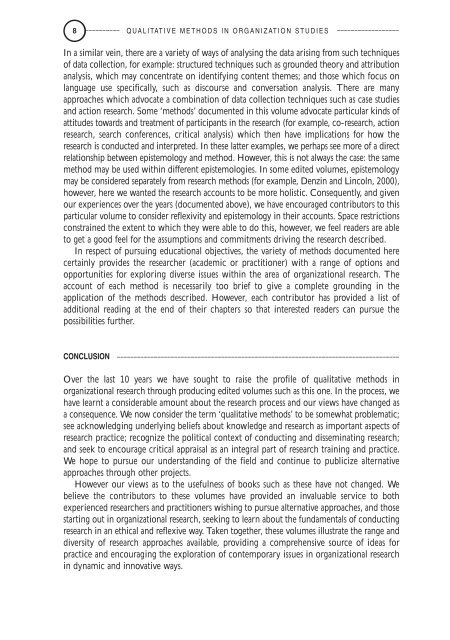essential-guide-to-qualitative-in-organizational-research
essential-guide-to-qualitative-in-organizational-research
essential-guide-to-qualitative-in-organizational-research
- No tags were found...
Create successful ePaper yourself
Turn your PDF publications into a flip-book with our unique Google optimized e-Paper software.
8 –––––––––– QUALITATIVE METHODS IN ORGANIZATION STUDIES ––––––––––––––––––In a similar ve<strong>in</strong>, there are a variety of ways of analys<strong>in</strong>g the data aris<strong>in</strong>g from such techniquesof data collection, for example: structured techniques such as grounded theory and attributionanalysis, which may concentrate on identify<strong>in</strong>g content themes; and those which focus onlanguage use specifically, such as discourse and conversation analysis. There are manyapproaches which advocate a comb<strong>in</strong>ation of data collection techniques such as case studiesand action <strong>research</strong>. Some ‘methods’ documented <strong>in</strong> this volume advocate particular k<strong>in</strong>ds ofattitudes <strong>to</strong>wards and treatment of participants <strong>in</strong> the <strong>research</strong> (for example, co-<strong>research</strong>, action<strong>research</strong>, search conferences, critical analysis) which then have implications for how the<strong>research</strong> is conducted and <strong>in</strong>terpreted. In these latter examples, we perhaps see more of a directrelationship between epistemology and method. However, this is not always the case: the samemethod may be used with<strong>in</strong> different epistemologies. In some edited volumes, epistemologymay be considered separately from <strong>research</strong> methods (for example, Denz<strong>in</strong> and L<strong>in</strong>coln, 2000),however, here we wanted the <strong>research</strong> accounts <strong>to</strong> be more holistic. Consequently, and givenour experiences over the years (documented above), we have encouraged contribu<strong>to</strong>rs <strong>to</strong> thisparticular volume <strong>to</strong> consider reflexivity and epistemology <strong>in</strong> their accounts. Space restrictionsconstra<strong>in</strong>ed the extent <strong>to</strong> which they were able <strong>to</strong> do this, however, we feel readers are able<strong>to</strong> get a good feel for the assumptions and commitments driv<strong>in</strong>g the <strong>research</strong> described.In respect of pursu<strong>in</strong>g educational objectives, the variety of methods documented herecerta<strong>in</strong>ly provides the <strong>research</strong>er (academic or practitioner) with a range of options andopportunities for explor<strong>in</strong>g diverse issues with<strong>in</strong> the area of <strong>organizational</strong> <strong>research</strong>. Theaccount of each method is necessarily <strong>to</strong>o brief <strong>to</strong> give a complete ground<strong>in</strong>g <strong>in</strong> theapplication of the methods described. However, each contribu<strong>to</strong>r has provided a list ofadditional read<strong>in</strong>g at the end of their chapters so that <strong>in</strong>terested readers can pursue thepossibilities further.CONCLUSION ––––––––––––––––––––––––––––––––––––––––––––––––––––––––––––––––––––––––––––––––––––Over the last 10 years we have sought <strong>to</strong> raise the profile of <strong>qualitative</strong> methods <strong>in</strong><strong>organizational</strong> <strong>research</strong> through produc<strong>in</strong>g edited volumes such as this one. In the process, wehave learnt a considerable amount about the <strong>research</strong> process and our views have changed asa consequence. We now consider the term ‘<strong>qualitative</strong> methods’ <strong>to</strong> be somewhat problematic;see acknowledg<strong>in</strong>g underly<strong>in</strong>g beliefs about knowledge and <strong>research</strong> as important aspects of<strong>research</strong> practice; recognize the political context of conduct<strong>in</strong>g and dissem<strong>in</strong>at<strong>in</strong>g <strong>research</strong>;and seek <strong>to</strong> encourage critical appraisal as an <strong>in</strong>tegral part of <strong>research</strong> tra<strong>in</strong><strong>in</strong>g and practice.We hope <strong>to</strong> pursue our understand<strong>in</strong>g of the field and cont<strong>in</strong>ue <strong>to</strong> publicize alternativeapproaches through other projects.However our views as <strong>to</strong> the usefulness of books such as these have not changed. Webelieve the contribu<strong>to</strong>rs <strong>to</strong> these volumes have provided an <strong>in</strong>valuable service <strong>to</strong> bothexperienced <strong>research</strong>ers and practitioners wish<strong>in</strong>g <strong>to</strong> pursue alternative approaches, and thosestart<strong>in</strong>g out <strong>in</strong> <strong>organizational</strong> <strong>research</strong>, seek<strong>in</strong>g <strong>to</strong> learn about the fundamentals of conduct<strong>in</strong>g<strong>research</strong> <strong>in</strong> an ethical and reflexive way. Taken <strong>to</strong>gether, these volumes illustrate the range anddiversity of <strong>research</strong> approaches available, provid<strong>in</strong>g a comprehensive source of ideas forpractice and encourag<strong>in</strong>g the exploration of contemporary issues <strong>in</strong> <strong>organizational</strong> <strong>research</strong><strong>in</strong> dynamic and <strong>in</strong>novative ways.



